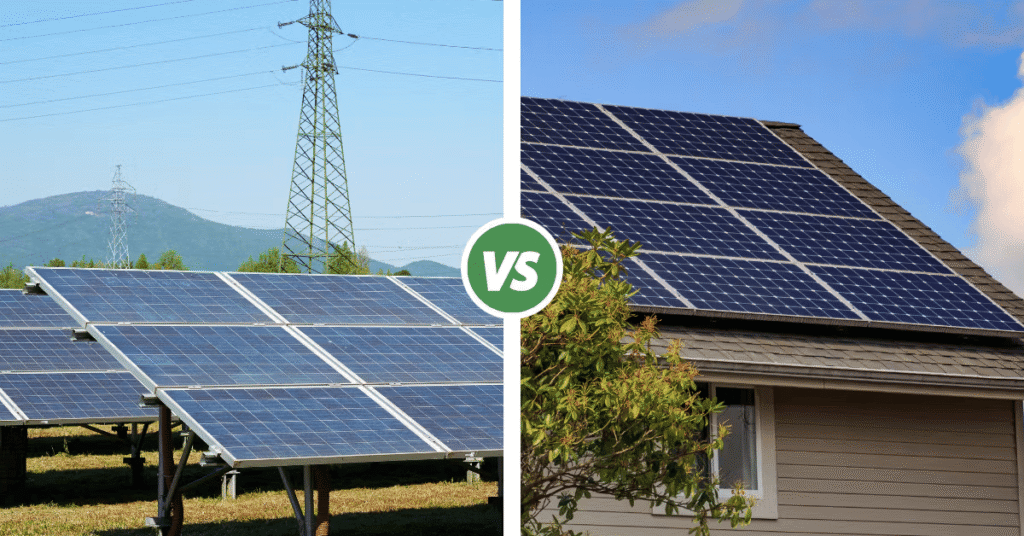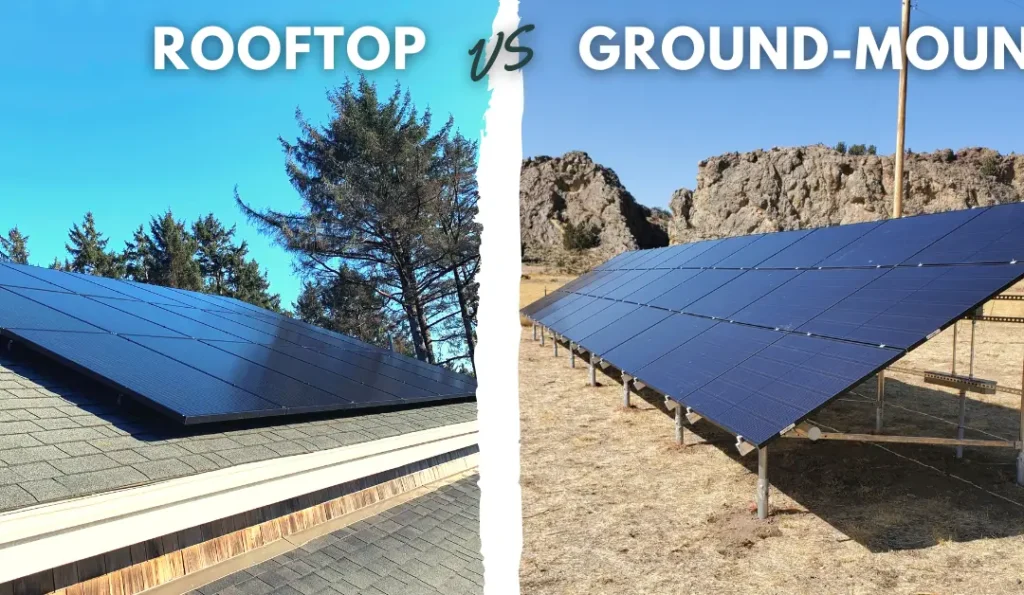India is seeing a big shift toward solar energy. From homes to factories, everyone wants to lower electricity bills and go green. One of the most common questions people ask is: Should I install rooftop solar panels or ground-mount solar systems?
Both options have their own benefits and drawbacks. Choosing the right solar panel setup depends on your location, space, energy needs, and budget. In this guide, we’ll explain everything in simple terms to help you make the best decision for your solar journey.
What Is a Rooftop Solar System?

A rooftop solar system is installed on the roof of your house, office, or factory. The solar panels are mounted using metal frames fixed to the roof.
Benefits of Rooftop Solar:
- No land needed – uses existing roof space
- Lower installation cost
- Ideal for city homes and small businesses
- Saves electricity bills
- Government subsidies available for residential users
- Great for residential solar in India
Disadvantages:
- Roof must be strong and in good shape
- Limited space on the roof
- Cleaning and maintenance can be difficult
- Roof direction affects panel performance
What Is a Ground-Mount Solar System?
A ground-mounted solar system is installed directly on the land using support structures. These systems are usually placed in open spaces, fields, or backyards.
Benefits of Ground-Mount Solar:
- Panels can face the sun perfectly for more energy
- Easy to clean and maintain
- Better airflow helps panels stay cool
- Expandable for future energy needs
- Ideal for farms, schools, factories, and large homes
Disadvantages:
- Needs open land
- Installation cost is higher
- May need permissions for land use
- Not ideal for urban homes without space
Also Read Don’t Fall for These! Top 10 Myths About Solar Energy Busted for Indian Homes and Businesses
Cost Comparison: Rooftop vs Ground-Mount Solar in India
Rooftop solar systems usually cost less to install because they don’t require land or complex structures. A 3kW residential rooftop solar system in India costs around ₹1.5 lakh to ₹1.8 lakh after subsidies.
Ground-mount solar systems are costlier due to land preparation, mounting structures, and longer wiring. However, they offer better energy production over time. For commercial or agricultural solar projects, ground-mount systems are more suitable despite the higher initial cost.
Performance & Efficiency
Ground-mount solar panels can be installed at the perfect tilt and direction to face the sun. This increases their energy generation by 10–15% compared to rooftop systems.
On the other hand, rooftop panels depend on the angle and direction of the roof. If your roof faces north or is flat, you might lose some efficiency. Also, rooftop panels can get hotter due to lack of airflow, which may reduce their performance.
In hot Indian states like Rajasthan, Gujarat, or Maharashtra, better ventilation in ground-mount systems helps keep solar panels cooler and more efficient.
Maintenance and Cleaning
Maintenance is easier with ground-mounted systems. You can clean them using a garden hose or cloth and check for dust or damage easily.
With rooftop systems, cleaning is tougher. It often requires ladders or professional services. Dust and pollution, common in Indian cities, can lower solar efficiency. So regular cleaning is important for both types.
Space and Scalability
If your roof is small, you may only be able to install a 1–3 kW system. This is enough for a small household.
If you own open land or farmland, you can install a larger ground-mount solar plant. These are ideal for schools, factories, hospitals, and large homes that need more power. You can also scale them in future by adding more panels.
Government Support & Solar Subsidies
In India, rooftop solar systems are supported by government schemes like the PM Surya Ghar Yojana. You can get subsidies of up to ₹78,000 for a 3 kW system.
Ground-mount systems used in agriculture or rural areas can benefit from schemes like PM KUSUM Yojana. This scheme helps farmers install solar pumps and grid-connected solar plants.
Make sure to check your state solar policy to know about extra incentives or net metering options.
Which System Should You Choose?
Here’s a quick comparison to help you decide:
| Feature | Rooftop Solar | Ground-Mount Solar |
|---|---|---|
| Space Required | Roof space only | Open land needed |
| Cost | Lower | Higher |
| Maintenance | Harder | Easier |
| Energy Efficiency | Good | Better |
| Expandability | Limited | Easy to expand |
| Ideal for | Homes, Apartments | Farms, Factories, Large Homes |
| Government Subsidy | Yes | Yes (for specific uses) |
Real-World Examples in India
- Urban homes in Delhi and Mumbai use rooftop solar to cut monthly bills.
- Farms in Punjab and Rajasthan use ground-mounted solar pumps to water fields.
- Factories in Tamil Nadu and Gujarat install large solar ground plants for industrial power needs.
Many Indian homes now save ₹1,500 to ₹3,000 per month after installing rooftop solar. Ground-mount systems in factories save lakhs in annual energy bills.
FAQs: Rooftop vs Ground-Mount Solar
Q1. Which is better for home use in Indian cities?
Q2. Can I install ground-mount solar on farmland?
Q3. Is rooftop solar eligible for government subsidy in India?
Q4. Does ground-mounted solar produce more electricity?
Q5. Which solar type is easier to maintain?
Conclusion
Both rooftop solar and ground-mount solar systems are great options for switching to clean energy in India. The best choice depends on your space, budget, and power needs.
For small homes in cities, rooftop solar is more practical and affordable. For large homes, farms, schools, and industries, ground-mount solar offers better performance and easy expansion.
No matter which system you choose, installing solar will help reduce electricity bills, fight climate change, and bring long-term savings. Be sure to work with trusted solar installers and check for available subsidies to get the most from your investment.
Author- Ayush






